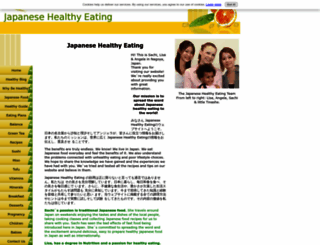Healthy Eating the Japanese way
Page Load Speed
1.3 sec in total
First Response
133 ms
Resources Loaded
876 ms
Page Rendered
286 ms

About Website
Welcome to japanese-healthy-eating.com homepage info - get ready to check Japanese Healthy Eating best content right away, or after learning these important things about japanese-healthy-eating.com
We`re spreading the word about Japanese healthy eating - simple and easy japanese food recipes and healthy diet tips
Visit japanese-healthy-eating.comKey Findings
We analyzed Japanese-healthy-eating.com page load time and found that the first response time was 133 ms and then it took 1.2 sec to load all DOM resources and completely render a web page. This is quite a good result, as only 20% of websites can load faster.